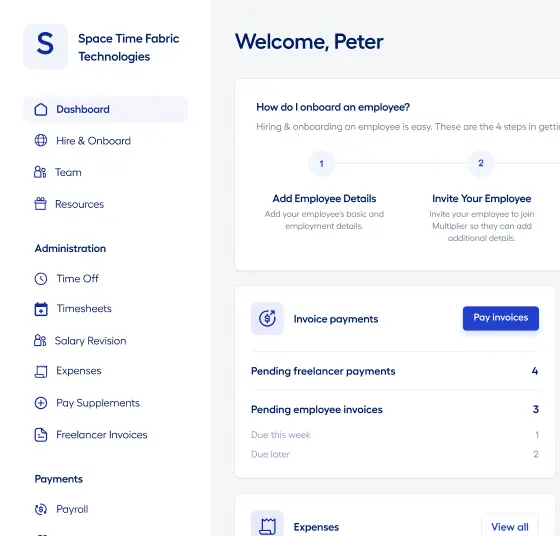The world is now truly hyperconnected, and more and more companies are seeking to expand their global footprint into new markets and geographies. However, expansion often comes with unique challenges that companies might be unwilling or unable to address. These challenges frequently occur due to limitations with current resources or a lack of knowledge about the nuances of conducting business in a new market.
Just some of the potential challenges include:
- The need to set up legal entities and understand complex employment laws
- The difficulty of maintaining compliance with jurisdictional tax and labor laws to avoid penalties
- Increased overheads due to the need to hire a fully staffed HR department and legal staff to ensure compliance with local regulations
- Issues hiring talent in new markets without knowledge of local customs and cultural differences
- Lack of knowledge about what constitutes a competitive and employee-centered benefit plan focused on health care, retirement plans, and insurance coverage.
These challenges can be costly and time-consuming for a company to navigate independently, so many organizations turn to an Employer of Record (EOR) to help expand into new markets.
EORs also benefit employees, especially those in developing countries, by providing a streamlined and engaging employee experience that meets employees’ expectations in the new market.
EORs help employers unlock new opportunities
Employers are discovering that going it alone when trying to expand is rife with risks and potential pitfalls.
A few of the top reasons why many turn to EORs for assistance include:
- Saving time and money. When expanding into global markets, EORs eliminate the need to establish legal entities, helping to sidestep the costs and time involved in setting up these entities.
- Ensuring regulatory compliance. EORs ensure compliance with local employment regulations and labor laws, helping to mitigate potential legal risks.
- Assuming administrative tasks. EORs simplify managing a distributed, global workforce by handling local payroll, tax liabilities, benefits, and hiring.
- Handling onboarding and employee management. EORs have the ability to handle a global talent pool. Through refined technological capabilities, they can quickly onboard skilled professionals in foreign markets on your behalf. They can also quickly and effectively build teams capable of supporting rapid market entry and growth.
- Administering employee benefits. Understanding benefit expectations in a global market with different regional and local laws, like the Affordable Care Act in the U.S., or differences in the number of weeks of paid time off or maternity leave, can be challenging.
Engaging the services of an EOR allows your business to concentrate on its strategic priorities and initiatives, such as expansion and employee development. And you can do this knowing that you are in the capable hands of experts keen to help guide your expansion in an economical, compliant, and expeditious way.
You should, then, consider engaging an EOR if you lack the necessary financial, HR, time, or labor resources—or if you’re just risk-averse and don’t want to take any chances regarding compliance and risk mitigation. No judgment here!
EORs unlock new opportunities for employees
When you start looking at expanding into a new market, you have a whole new talent pool at your disposal. That’s the good part. On the other side of the equation are different currencies, cultural nuances, localized benefit preferences and expectations, and workforce classifications.
You’ll want to make your distributed workforce feel like part of your greater organization, not siloed workers with no real connection. An EOR can help with that. “How?” we here you ask.
Well, an EOR can:
- Help employees in the new market feel like they are part of the larger team by treating them like your employees at “home.”
- Provide employees with an all-around benefit experience similar to those they are used to in their home country, including healthcare, insurance, paid time off, and retirement savings programs.
- Ensure that payroll is handled efficiently, which means employees are paid on time, accurately, and with the proper withholding based on their location.
- Provide employees hired in developing nations with significant economic and professional development and opportunities to gain additional skills and development that enhance upward mobility.
Overall, employees can benefit from the stability, support, and focus on compliance that EORs offer. This allows them to concentrate on their professional roles and grow your company in the new market.
New opportunities ahoy
In short, an EOR is all about opportunity, for employers and employees alike. By partnering with an EOR, employers can continue to focus on their core business activities while mitigating legal compliance and workforce management risks in different countries.
Employees, meanwhile, can access a broader range of benefits and enjoy peace of mind, knowing that their rights and protections under employment regulations are secure.
Tempted? Speak to an expert today to find out more about how EORs can help.







